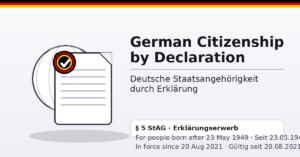Administrative Court of Munich, May 11, 2017, Case No.: M 12 K 16.2612
According to § 25b Para. 1 S.1, 2 AufenthG, a tolerated foreigner should be granted a residence permit in deviation from § 5 Para. 1 No. 1 and Para. 2 AufenthG if they have integrated into the living conditions of the Federal Republic of Germany in a sustainable manner. This generally requires that the foreigner has resided in Germany for at least six years or, if living with a minor unmarried child in the same household, for at least four years without interruption on a tolerated, authorised or residence permit basis; is committed to the free democratic basic order of the Federal Republic of Germany and has a basic knowledge of the legal and social order and living conditions in the federal territory; secures his or her livelihood predominantly through gainful employment or, considering the previous school, training, income and family life situation, it can be expected that he or she will secure his or her livelihood within the meaning of § 2 Para. 3 AufenthG, whereby the receipt of housing benefit is irrelevant; has sufficient oral German language skills at level A2 of the Common European Framework of Reference for Languages and, in the case of children of compulsory school age, can provide evidence of their actual school attendance. Para. 1 sentence 1 of § 25b AufenthG sets out the basic framework for the granting of a residence permit, i.e. integration into living conditions. Para. 1 sentence 2 provides guidance for assessing whether integration has taken place. As a rule, the existence of the requirements is necessary but also sufficient to assume sustainable integration (see Higher Administrative Court for the State of North Rhine-Westphalia, decision of 21 July 2015 - 18 B 486/14 , para. 8, juris).
The present judgment addresses the issue of whether a foreign national who has stayed in Germany for 25 years, with several years of tolerated status, is entitled to a residence permit under § 25b (1) AufenthG.
Introduction and Background
The plaintiff is from Ethiopia and entered the Federal Republic of Germany in February 1992. He is now seeking the issuance of a residence permit. His asylum application was rejected in June 1994, and this decision became final in May 2001. Despite the rejection, the plaintiff received various tolerations from October 2002 to December 2012, as he could not provide travel documents.
In March 2005, he applied for a residence permit, which was denied in September of the same year. The lawsuit filed against this decision was dismissed by the Administrative Court in March 2006, and an application for the admission of the appeal was also unsuccessful. In October 2012, the plaintiff again applied for a residence permit and was granted a temporary permit valid until December 2012. After another application in December 2012, he was issued a fictitious certificate valid until July 2016.
Requirement for Further Evidence
In 2015 and 2016, the immigration authority repeatedly requested the plaintiff to provide evidence such as an employment contract, salary statements, and an employer’s confirmation to assess the conditions for extending the residence permit. The plaintiff then submitted some documents, including an employer’s certificate and confirmation that he did not receive benefits under the Second Book of the Social Code (SGB II). Despite these documents, his application for an extension of the residence permit was denied in May 2016. The authority justified this by stating that the plaintiff could not secure his livelihood permanently and had not provided all necessary evidence.
Complaint Against the Rejection
The plaintiff, through his representative, filed a lawsuit against the decision and demanded the annulment of the decision as well as the obligation of the authority to issue him a residence permit. He argued that since May 2016, he has been employed in a permanent and unannounced job, which provides him with a net monthly income of more than 900 euros. Additionally, since July 2016, he has had a side job earning an extra 200 euros per month. His livelihood was secured as his monthly rent was only 485 euros.
Response from the Defendant
The immigration authority pointed out that the plaintiff had previously received SGB II benefits for years. Moreover, the employer’s confirmation from 2015 was during a period when the plaintiff was receiving these benefits. Despite the plaintiff’s claim of having a permanent job, his livelihood security could not be guaranteed. The defendant emphasized that after deducting rent, the plaintiff’s income was only slightly above the standard needs, and the additional 200 euros from the side job had not been proven. For these reasons, the prognosis for long-term livelihood security was negative.
Decision of the Munich Administrative Court
The Administrative Court of Munich decided that the lawsuit was admissible but unfounded. It explained that the plaintiff did not have a right to a residence permit as the conditions of § 25b of the Residence Act (AufenthG) were not met. According to this provision, a tolerated foreign national can be granted a residence permit if they have sustainably integrated into life in Germany. However, the conditions for such integration, particularly livelihood security, were not met in the plaintiff’s case.
The court found that despite the plaintiff’s permanent employment, he had not provided sufficient evidence to support a positive prognosis regarding the permanent security of his livelihood. Specifically, he had only provided a pay slip and a copy of the employment contract, while the original was required for authenticity. Furthermore, the court noted discrepancies between the employer’s confirmation and the employment contract, questioning the credibility of the plaintiff’s statements.
Conclusion and Outcome
The Administrative Court concluded that the requirements for issuing a residence permit were not met. There was no recognizable sustainable integration of the plaintiff into German living conditions, nor were there any exceptional circumstances that would justify an exception. Also, there were no family or other protective ties in Germany. The plaintiff had received social benefits for years and frequently changed employers, which was contrary to stable economic integration.
Moreover, the rejection of the extension of the residence permit was deemed proportionate. It was reasonable to expect the plaintiff to build a life in his home country. Other legal grounds for a residence permit were also not apparent. For these reasons, the court dismissed the lawsuit and confirmed the deportation order and the set departure deadline as legally permissible.
Source: Munich Administrative Court
Important Note: The content of this article has been prepared to the best of our knowledge and belief. However, due to the complexity and constant evolution of the subject matter, we must exclude liability and warranty. Important Notice: The content of this article has been created to the best of our knowledge and understanding. However, due to the complexity and constant changes in the subject matter, we must exclude any liability and warranty.
If you need legal advice, please feel free to call us at 0221 - 80187670 or send us an email to info@mth-partner.de
Lawyers in Cologne advise and represent clients nationwide in immigration law.




